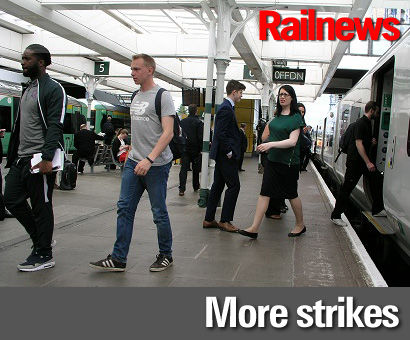THE second day of strikes by RMT conductors has begun, and three operators are affected today.
Of these, Greater Anglia and Southern expect to run almost normal services, but South Western Railway is likely to lose 40 per cent of services during the day, and 30 per cent in the peaks.
Two other operators, Merseyrail and Northern, were affected by 24-hour strikes yesterday, along with Greater Anglia, SWR and Southern.
The industrial situation remains mixed, because ASLEF drivers on Southern have accepted a five-year deal while the RMT is standing firm, repeating its call for the government to intervene.
RMT general secretary Mick Cash said: “On behalf of RMT I repeat the demand that Theresa May and Chris Grayling call off the centrally imposed blockade on serious talks in these disputes and allow us to get on with genuine negotiations with their contractors."
“If the Government allows normal industrial relations to recommence it would free the union up to negotiate deals like the ones we have successfully struck in Wales and Scotland that guarantee a guard on the trains.”
The RMT has also described the settlement with ASLEF drivers on Southern as ‘shoddy’.
The result of a drivers' ballot has confirmed by 731 to 193 a deal recommended by the ASLEF executive. This includes a five-year pay settlement worth a total of 28.5 per cent between 2016 and 2020, and therefore covers the rest of the present Govia Thameslink Railway franchise. Recent reports have suggested that the GTR contract, which includes Southern, may not be awarded again in its present form.
ASLEF general secretary Mick Whelan said: “The agreement means we will have a second safety-trained person on every train covered by this agreement except in exceptional circumstances. That person will have all the relevant safety competence – including the skills to evacuate passengers in an emergency.
"The agreement also confirms the terms and conditions under which our members at Southern are employed."
ASLEF also emphasised that the new settlement only applies on Southern. Mr Whelan added: "It’s important to stress that this deal is company-specific and does not have implications for any other train operating company."
Mick Cash of the RMT, meanwhile, claimed that the settlement had been achieved partly because of the threat of growing legal costs. GTR took a dispute with ASLEF over longer trains to the High Court in April last year, preventing walkouts on Gatwick Express.
Mr Cash described "a massive financial stick that the Courts had handed over to beat the union and its members with. RMT believes that threat had a decisive impact on this result."
A spokesman for ASLEF told Railnews: "We have had three ballots, and the most recent was a vote by our members to accept. The legal costs position has not changed since the beginning of 2017 and was not a factor contributing to this settlement."
Nick Brown, who is chief operating officer at Govia Thameslink Railway, said: "This dispute has been difficult for our passengers in particular and we are pleased that we can now move ahead and deliver stability by finally concluding this deal with ASLEF.
"Our trains will be planned to have a second person on board and this has been the arrangement we have operated over the last year. More on-train staff are on more trains with more passengers than ever before. The on-board service concept has been welcomed by our passengers across the board.
"Should, in certain circumstances, a train not have that second person on board then it will still be able to run until a replacement can be provided. Avoiding cancellations is key to delivering a resilient and reliable service."


